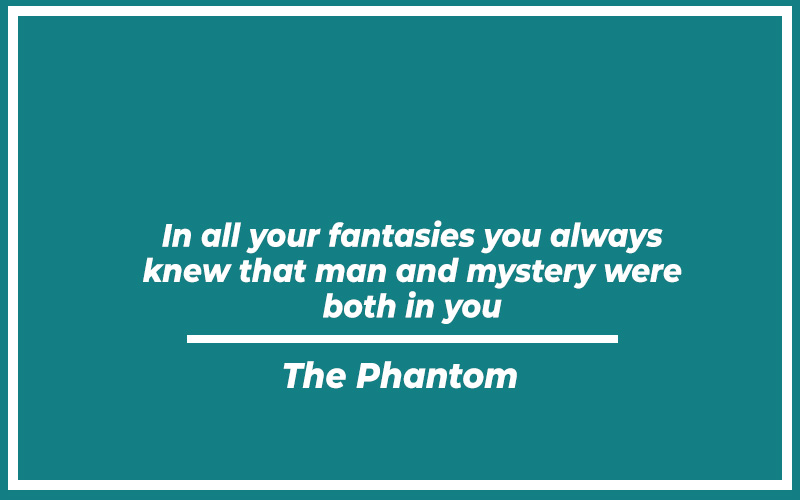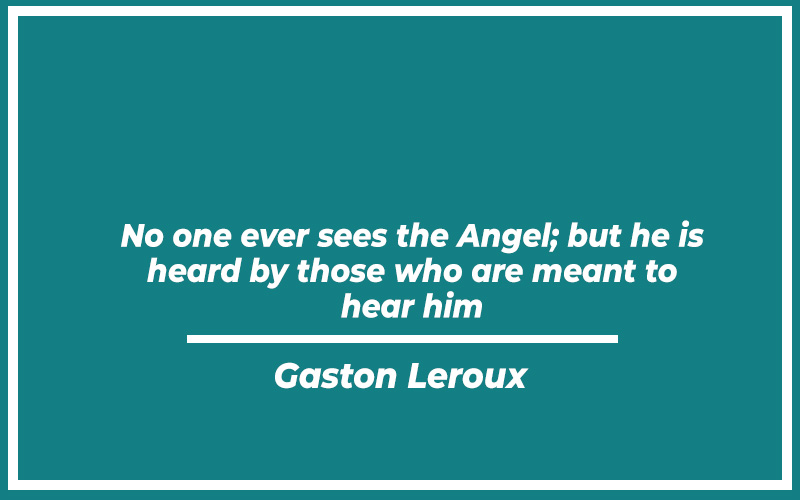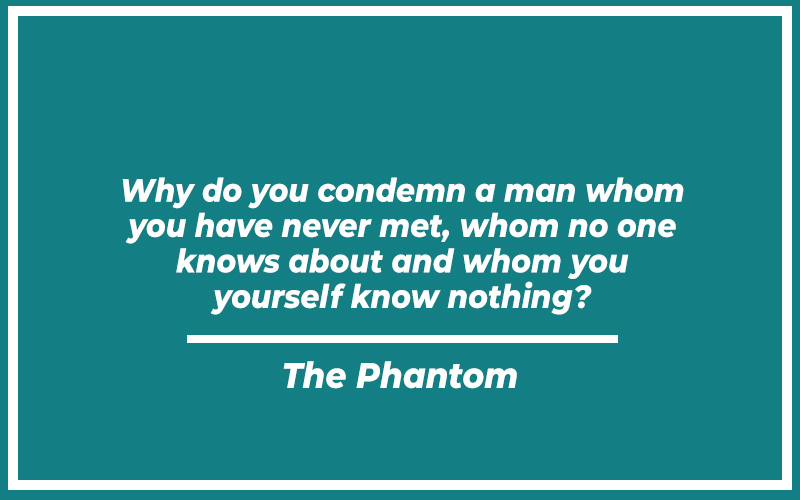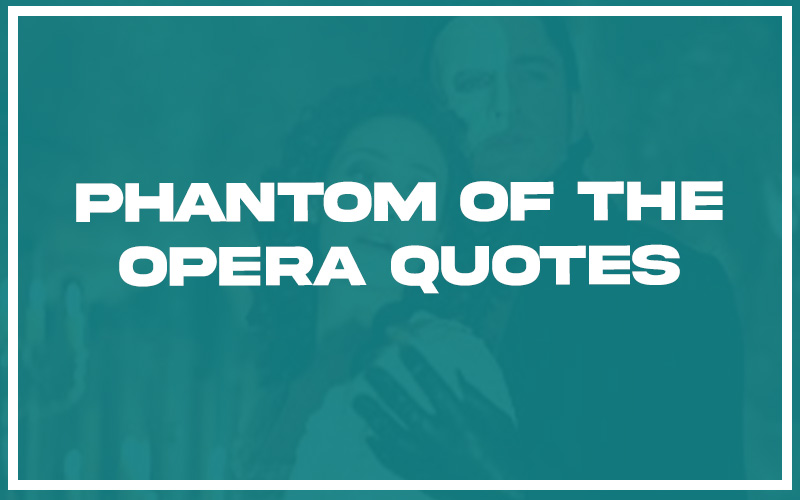When you step into the shadowy corridors of “The Phantom of the Opera,” the quotes you encounter resonate with a haunting beauty and profound tragedy.
These lines not only capture the mysterious allure of the Phantom but also the poignant emotions of love, desire, and rejection woven throughout the story.
Each quote serves as a window into the complex relationships and dramatic tensions that define the narrative, inviting you to ponder the themes of identity, passion, and the masks we all wear.
Best Phantom Of The Opera Quotes

“In all your fantasies you always knew that man and mystery were both in you.” – The Phantom
This quote from “The Phantom of the Opera” encapsulates the internal struggle and the inherent duality within the Phantom, suggesting that every individual harbors both mundane and enigmatic elements. It invites audiences to recognize and reconcile the diverse facets of their own identities.
The line emphasizes the blend of the ordinary and the extraordinary within us, urging a reflection on our hidden depths and the mysteries that define our persona, and encourages an acceptance of the complex entirety of our beings.
Also Read:Melanie Martinez Quotes (with Explanation)
“The tears I might have shed for your dark fate, grow cold and turn to tears of hate!” – Christine Daaé
Christine’s transformation of feeling from sympathy to disdain for the Phantom is poignantly captured in this quote. It reflects the emotional journey from compassion to a hardened heart, a change brought about by betrayal and disillusionment.
This line not only underscores the themes of love turned sour and the impact of broken trust but also highlights the potent force of emotional evolution, emphasizing how experiences shape our responses and can drastically alter our perceptions and feelings towards others.
“You alone can make my song take flight. Help me make the music of the night.” – The Phantom
This lyrical plea from the Phantom to Christine symbolizes the transformative power of muses in the artistic process. The Phantom sees Christine as the key to unlocking the full potential of his musical creations, representing the deep connection and dependency artists can have with their inspirations.
The quote conveys the essence of creative collaboration, where the muse not only inspires but actively elevates the artist’s work, illustrating the intimate and sometimes indispensable relationship between creator and catalyst.
“No more memories, no more silent tears. No more gazing across the wasted years.” – Christine Daaé
Christine’s resolution to move forward from her past represents a significant emotional and psychological step towards healing. This declaration of letting go signifies a break from the pain and regrets that have previously defined her, advocating for a focus on the present and future rather than being anchored to what has been.
It’s a universal message about the importance of overcoming past traumas to embrace the potential for new beginnings and personal growth.
“Why do you condemn a man whom you have never met, whom no one knows and about whom even you yourself know nothing?” – The Phantom
This quote challenges the quick judgments and prejudices that are often formed without true understanding. The Phantom, often judged harshly by those around him, highlights the injustice of these judgments.
This line prompts reflection on how society often ostracizes individuals based on superficial or unfounded perceptions, advocating for a more compassionate and informed approach to understanding people who are different or misunderstood.
“Sometimes, the Angel [of Music] leans over the cradle… and that is how there are little prodigies who play the fiddle at six better than men of fifty, which, you must admit is very wonderful.” – The Phantom
This enchanting observation by the Phantom delves into the origins of musical prodigy, attributing extraordinary talent to the mythical influence of the “Angel of Music.” It’s a poetic way of explaining the natural gift of music that some are born with, suggesting that such skills are almost divine in nature.
This quote celebrates the mystery and magic of innate talent, while also hinting at the supernatural or predestined role that fate might play in the arts.
“She’s singing to-night to bring the chandelier down!” – Meg Giry
This dramatic statement foreshadows one of the most iconic and catastrophic scenes in “The Phantom of the Opera,” where the literal and metaphorical fall of the chandelier represents the climax of the unfolding drama.
It symbolizes the destructive power of passion and vengeance, serving as a pivotal moment that changes the course of all characters involved. This line captures the intensity of the moment and the inevitable collision of forces set in motion by the tumultuous events of the opera.
“This haunted face holds no horror for me now. It’s in your soul that the true distortion lies.” – Christine Daaé
Christine Daaé‘s bold confrontation with the Phantom underscores a profound realization: true horror stems from moral corruption, not physical deformities. This moment of enlightenment shifts the narrative from surface-level judgments to deeper, intrinsic values, challenging societal norms that equate physical appearance with virtue or vice.
Christine’s declaration serves as a critical commentary on the human tendency to fear what looks different, instead focusing on the inner character, which she finds far more terrifying and distorted than any facial scar.
“But his voice filled my spirit with a strange, sweet sound. In that night, there was music in my mind.” – Christine Daaé
Christine’s reflection on the Phantom’s voice highlights music’s profound emotional impact, capable of transcending ordinary experience and filling the soul with an almost ethereal presence. This quote captures the essence of artistic transcendence, where the auditory experience becomes a transformative spiritual event.
It speaks to the power of music to move beyond mere entertainment, touching the deepest parts of our psyche and altering our emotional landscape, illustrating how profoundly art can resonate within us, shaping our perceptions and feelings.
“For the past five years, these walls have been my world…but now I remember there was a time when darkness was beautiful.” – The Phantom
This introspective remark from the Phantom illustrates the dual nature of solitude and isolation. Initially finding solace in the dark, secluded environment, he eventually recognizes its oppressive qualities over time. This evolution in perception showcases the complex relationship individuals have with their surroundings, where isolation can be both a refuge and a prison.
The quote delves into themes of memory and change, reflecting on how perspectives shift with experiences, and how even the comforting embrace of darkness can become a source of despair.
“You were once my one companion… you were all that mattered.” – Christine Daaé
In this poignant reflection, Christine acknowledges the depth of her past connection with the Phantom, emphasizing the profound impact of significant relationships on our lives. This quote explores the themes of loss and nostalgia, highlighting the emotional weight of recalling a connection that once defined one’s existence.
It is a testament to the lingering influence of deep relationships, illustrating how they shape our identities and priorities, and the pain that accompanies their transformation or loss.
“I have been dead for a long time, but you have brought me back to life.” – The Phantom
The Phantom expresses a profound rebirth through Christine’s influence, symbolizing the redemptive power of love and human connection. This statement reflects on the transformative potential that comes from meaningful relationships, suggesting that emotional or spiritual revitalization is possible even after long periods of despair.
It underscores the idea that love and care can resurrect a sense of life and purpose in those who feel emotionally desolate, offering a message of hope and renewal.
“All I wanted was to be loved for myself. If you loved me I should be as gentle as a lamb.” – The Phantom
This heartfelt plea from the Phantom highlights his deep-seated yearning for acceptance and love, stripped of pretense and condition. It speaks to the transformative effect of genuine affection and acceptance on one’s demeanor and actions.
The quote delves into themes of conditional versus unconditional love, exploring how the former can provoke fear and concealment, while the latter fosters openness and transformation. It challenges the listener to consider the power of acceptance and the profound changes it can bring about in a person.
“Fear can turn to love. You’ll learn to see, to find the man behind the monster.” – Raoul
Raoul’s observation offers a hopeful perspective on human relationships, suggesting that understanding and empathy can transform fear into love. This quote encourages looking beyond initial impressions to discover the humanity that lies beneath outward appearances or reputations.
It advocates for a deeper engagement with others, promoting the idea that empathy and understanding can overcome fear and prejudice, revealing the complex, often misunderstood nature of individuals deemed as ‘monstrous’.
“Pearls are for tears, Erik. Didn’t you know?” – Christine Daaé
Christine Daaé’s poignant reminder to Erik uses the metaphor of pearls representing tears, reflecting the sadness that permeates their relationship. This symbolic statement highlights the emotional costs of their interactions, where beauty is marred by sorrow.
It underscores the theme that valuable relationships often come with a heavy emotional burden, revealing Christine’s awareness and resignation to the grief entwined with her connection to Erik. This line encourages reflection on the inherent sacrifices in relationships marked by deep, albeit troubled, emotional ties.
“Don Juan Triumphant is finished; and now I want to live like everybody else. I want to have a wife like everybody else and to take her out on Sundays.” – Erik
This quote captures Erik’s yearning for normalcy and societal acceptance amidst his tumultuous life hidden in the opera house’s shadows. It reflects his deep-seated loneliness and desire for simple, everyday pleasures that seem so out of reach for someone with his unique condition.
Erik’s aspiration to live an ordinary life underscores the universal human need for companionship and belonging, revealing the often-overlooked pain of those who feel excluded from normal societal rhythms due to their differences.

“No one ever sees the Angel; but he is heard by those who are meant to hear him.” – Gaston Leroux
This mysterious quote delves into the selective nature of profound influences in our lives, suggesting that only those destined to be impacted by the “Angel of Music” will truly understand and hear his guidance.
It speaks to the idea that some experiences and inspirations are not universal but intensely personal and meaningful to those they touch. The line evokes a sense of mysticism and destiny, emphasizing that life’s most profound influences often come in intangible forms.
“I am going to die of love… daroga… I am dying of love… That’s how it is… I loved her so! And I love her still… daroga… and I am dying of love for her, I tell you!” – Erik
Erik’s dramatic declaration of his fatal love for Christine epitomizes the destructive potential of unrequited and obsessive love. His words paint a vivid picture of emotional turmoil and self-destruction, driven by an intense and unreturned passion.
This quote highlights the tragic beauty of his love, which, while profound and genuine, leads to his own undoing. It serves as a powerful reminder of the fine line between love’s enchantment and its capacity to consume and destroy.
“Sometimes, the Angel [of Music] leans over the cradle… and that is how there are little prodigies who play the fiddle at six better than men of fifty, which, you must admit is very wonderful.” – Gaston Leroux
This reflection on the origins of musical prodigies combines elements of mystique and the supernatural with the realities of innate talent. It suggests that extraordinary abilities may be divinely inspired, attributing a mystical quality to the genesis of artistic genius.
This perspective not only romanticizes musical talent but also challenges the listener to consider the broader, perhaps metaphysical elements that contribute to exceptional capabilities in young musicians.
“You will be the happiest of women. And we will sing, all by ourselves, till we swoon away with delight.” – Erik
Erik’s vision of an idyllic life with Christine, isolated yet blissful, underscores his fantasy of perfect companionship where their music bonds them in joyful seclusion. This quote reveals his deep desire for an escape from the world’s judgment, seeking solace in an imagined utopia defined by mutual love and artistic expression.
It reflects his intense longing for acceptance and normalcy within the confines of an extraordinary life, highlighting the poignancy of his isolation and the dreams that sustain him.
“Our lives are one masked ball.” – Gaston Leroux
Leroux’s metaphor of life as a masked ball eloquently captures the essence of social facades. This line comments on the human propensity to hide true emotions, desires, and identities behind constructed personas, suggesting that life involves constant performance and deception.
It invites the reader to reflect on their own masks and the authenticity of their social interactions, probing the depth of what is shown to the world versus what is concealed within the soul.
“I’m sick and tired of having a forest and a torture chamber in my house… I want to have a nice quiet flat with ordinary doors and windows and a wife inside it, like anybody else!” – Erik
This quote reveals Erik’s weariness with his dramatic, isolated existence, highlighting his desire for a mundane, peaceful life. It underscores his longing for normalcy and domestic stability, elements that his current life severely lacks.
This sentiment resonates with anyone who has ever felt burdened by their circumstances and yearns for simplicity and normalcy. The quote invites empathy for Erik, portraying him not just as a villain but as a person with relatable desires and frustrations.
“A ghost who, on the same evening, carries off an opera-singer and steals twenty-thousand francs is a ghost who must have his hands very full!” – Gaston Leroux
This humorous quote lightens the gothic narrative, providing a whimsical perspective on the Phantom’s capabilities. It playfully acknowledges his multifaceted schemes and actions, contrasting the typically dark and serious tone of the story.
This line offers readers a moment of levity, showcasing Leroux’s ability to blend horror with humor, thereby enriching the depth of the narrative and making the Phantom a more dynamic character.
“Everybody knows that orthopedic science provides beautiful false noses for people who have lost their noses naturally or as a result of an operation.” – Gaston Leroux
Leroux comments on the advancements in medical prosthetics with a touch of irony, highlighting the contrast between Erik’s self-perception and available medical solutions. This line underscores the tragic irony that, despite technological progress, Erik’s emotional scars prevent him from seeking help.
It reflects on the broader theme of internal versus external healing, suggesting that true recovery often requires addressing psychological wounds as much as physical ones.
“We recognize the touch of the Opera ghost.” – Gaston Leroux
This quote captures the pervasive influence of the Phantom throughout the opera house, suggesting his actions and presence are unmistakable. It symbolizes his control and the fear he instills, but also the respect he commands through his expertise and mystery.
The line reflects on the duality of his character—both feared and revered, his ‘touch’ is a metaphor for his impact on every aspect of the opera, blending menace with allure.
“He fills me with horror and I do not hate him. How can I hate him, Raoul? Think of Erik at my feet, in the house on the lake, underground. He accuses himself, he curses himself, he implores my forgiveness!” – Christine Daaé
Christine expresses complex emotions toward Erik, oscillating between fear and compassion. This quote illustrates her internal conflict, torn between revulsion and sympathy.
It highlights the human capacity to empathize, even with those who cause us suffering, suggesting that understanding someone’s torment can temper our feelings of horror with pity.
“Christine, you must love me!” And Christine’s voice, infinitely sad and trembling, as though accompanied by tears, replied: ‘How can you talk like that? When I sing only for you!'” – Erik and Christine Daaé
This dialogue showcases the tragic nature of Erik and Christine’s relationship. Erik’s demand for love and Christine’s response—offering her singing as a gesture of devotion—highlights the unbridgeable gap between their desires.
It portrays the complexity of their interaction, where art becomes a substitute for the emotional connection Erik seeks but cannot have.

“Why do you condemn a man whom you have never met, whom no one knows about and whom you yourself know nothing?” – The Phantom
This rhetorical question challenges societal judgment and prejudice, advocating for understanding over condemnation. The Phantom’s plea highlights the often unfair treatment of individuals based on hearsay or their outward appearance.
This line encourages a deeper, more compassionate approach to understanding others, promoting empathy over judgment, and invites us to reflect on how we assess and treat those who are different.
Also Read: Ariana Grande Quotes (with Explanation)
Final Thoughts
Reflecting on “The Phantom of the Opera” quotes, you can’t help but feel moved by the depth of emotion and the intensity of the characters’ experiences.
These words linger in your mind like the echo of a poignant melody, reminding you of the transformative power of art and love.
Whether they inspire empathy for the misunderstood or a desire to embrace your own uniqueness, the quotes from this timeless story encourage you to look beyond appearances and to listen to the music beneath the surface.

